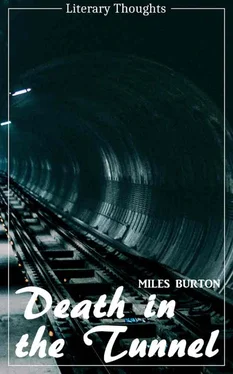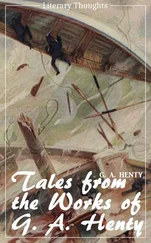“But, all the same, there are certain objections to the suicide theory. In the first place, I haven’t been able to light upon a vestige of reasonable motive. The only hint, so far, is that Sir Wilfred was worried by the disagreement between his daughter and her husband. But I refuse to believe that any amount of friction, however serious, between a daughter and a son-in-law would drive a man to suicide. Certainly not a man like Sir Wilfred. And, after all, the Wardours can’t have been on such desperately bad terms, since, apparently, they agreed to go off on a motor tour together.”
“I wouldn’t jump too hastily to the conclusion that there was a complete lack of motive,” said Merrion. “Saxonby was a man of many interests, and you may find that something had gone very seriously wrong somewhere. He may have had something on his mind which he shared with nobody else. What are your other objections to the suicide theory?”
“They are so trifling that they are hardly worth discussing. I’ll try to put them as simply as I can. Torrance says that there was a letter from Mrs. Wardour waiting for Sir Wilfred when he reached the office yesterday. The assistant secretary says that when he arrived, he selected one of his letters, read it, and laid it aside. I think we may assume that it was the one from his daughter, since he was anxious about her. Now, where is that letter? It was not to be found in his room, and there is no fire there in which he could have burnt it. Torrance suggests that he put it in his pocket. Most likely he did. But why wasn’t it in his pocket when the train reached Stourford? Again, we know that he presented his ticket at the barrier at Cannon Street, and we believe that, having done so, he put it back in his wallet. What became of that ticket?
“There are, of course, a thousand possible explanations of the disappearance of the letter and the ticket. For instance, Sir Wilfred may have thrown them out of the carriage window before the train reached Blackdown. But I can’t forget that curious and unexplained incident in the tunnel. Whether the driver actually saw those red and green lights, or whether he only imagined them, the fact remains that the train slowed down to about ten miles an hour or less. You can laugh at me, if you like.”
“I’m not likely to do that,” Merrion replied. “But I’d like you to explain the possible significance of that slowing down.”
“It’s hopelessly far-fetched. To begin with, the compartment had two doors. One, the left-hand one, looking towards the engine, led into the corridor, and was locked. The other, the right-hand one, led into the open, and was unlocked. Now, in this country, trains follow the rule of the road, and keep to the left. If anybody was in the tunnel as the train passed through, he would be standing on the up line, to avoid being run over by the train, which was on the down line. It would not have been impossible for him to have jumped upon the footboard, and entered Sir Wilfred’s compartment by the unlocked door.”
Merrion nodded. “I admit the possibility. We can go further, and say that it would be possible for this man to have shot Saxonby, stolen his ticket and the letter from his daughter, and jumped off the train again. But, apart from the possibility, we are bound to examine the probability of this having happened. And I’m bound to confess that I see a whole host of difficulties in the way. I’ll put them to you as they appear to me.
“To begin with, we have the extreme unlikelihood of there having been a man in the tunnel. According to the station-master at Blackdown, that unlikelihood amounts to impossibility. I wouldn’t go so far as to accept his statement without further investigation. But, all the same, since he knows more about the conditions than we do, we are bound to attach a certain weight to what he says.”
“It has occurred to me that there are other ways of getting into the tunnel than by entering it on foot,” said Arnold. “One might jump off a train while it was going through.”
“Yes,” Merrion replied doubtfully. “I shouldn’t care to do it myself, but I suppose it could be done. But I don’t suppose many trains slow up as conveniently as the one in which Saxonby was travelling. However, let’s admit the bare possibility of there having been a man in the tunnel, who deliberately slowed down the train so that he would be able to board it.
“Now, we pass on to the next point. In order that he could effect his purpose, it would be necessary that Saxonby should be travelling in a compartment by himself, and that his assailant should know which compartment this was. How could he have obtained the knowledge on either of these points? He might, it is true, have guessed that, for some reason with which he was acquainted, Saxonby would want to secure a compartment to himself. But how can he have known that Saxonby had been successful? Or, if he gambled on the probability of this success, how did he know which compartment it was? He couldn’t have seen Saxonby through the window, for that would almost certainly be obscured by the fumes from the engine.”
“Yes, I’m with you there,” said Arnold. “I noticed that for myself, as I was coming through this morning.”
“Good. Now we come to the man’s procedure. He provides himself with a pistol upon which he has engraved Saxonby’s initials. There’s nothing unreasonable about that. But, all the same, if the pistol wasn’t really Saxonby’s, it is peculiar that you should have found ammunition to fit it in his private filing cabinet.
“We needn’t, at present, enter into the question of motive. We don’t know enough about Saxonby and his affairs. We may find that he had a reasonable and sufficient motive for committing suicide. It is equally possible that we find that somebody had a reasonable and sufficient motive for killing him.
“Finally, there is the disappearance of the ticket and the letter. Now, I’m bound to admit that the theory of a man boarding the train from the tunnel might be twisted to account for that.
“Suppose this man, having shot Saxonby, did not leave the train again immediately. Suppose he unlocked the door leading into the corridor, passed through it, and locked it behind him. Suppose then that he hid in the lavatory until the train reached Stourford, and then got out? But he would need a ticket before he could leave the station. Foreseeing this necessity, he provided himself with Saxonby’s ticket.”
“That’s ingenious!” Arnold exclaimed. “I’ve always admired your imagination, as you know. And I’ve got a list of all the passengers who were travelling in that first-class coach.”
“You’ll probably find that very useful. This imaginary man of ours, having taken the ticket, may also have taken the letter, perhaps because its discovery might have given a clue to his own identity.
“But, in spite of what you choose to call the ingenuity of my arguments, I don’t like the theory of the man in the tunnel. It seems to me that the difficulties altogether outweigh the suggestion offered by the ticket. Quite frankly, I don’t believe that Saxonby was murdered. I believe that he shot himself. But, if you want a theory of how he might have been murdered, I think I can supply you with one which presents fewer difficulties than that of the man boarding the train in the tunnel.”
The Inspector smiled. “I’d love to hear it,” he said.
“Then so you shall. It is this. The murderer did not board the train in the tunnel. He left it there. That gets round the worst of the difficulties. Our man knew that Saxonby would be going home by the five o’clock from Cannon Street yesterday. No difficulty about that, for he did so nearly every Thursday. He may have been watching the train every Thursday for weeks, awaiting his opportunity. Yesterday he saw Saxonby installed in a carriage by himself, and realised that his opportunity had come.
Читать дальше












